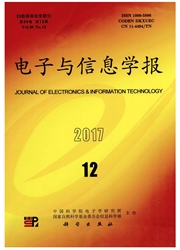

 中文摘要:
中文摘要:
目标识别是导弹防御系统的支撑技术,本文参考导弹防御系统配置,建立了基于时空信息序贯融合的综合识别数学模型,将专家知识、环境信息以及测量信息共同纳入综合识别流程。在空间域融合中,利用层次分析法度量了各技术途径的可靠性,并基于技术途径的可靠性和识别结果的一致性提出了“融合权重”的概念,用于度量各技术途径参与融合识别的重要程度:在时间域融合中,将D-S证据理论应用于融合识别结果的继承和更新。仿真实验结果表明,综合识别模型能够有效融合多个技术途径的局部决策,抑制个别奇异结果,具有较好的容错性能。
 英文摘要:
英文摘要:
Target discrimination is a key technique in missile defense system, and after analyzing the defense system configuration, an integrated target discrimination mathematical model based on recursive temporal-spatial data fusion is performed, which brings the expert knowledge, environmental information and measure information into the integrated discrimination flow. During spatial fusion process, the reliability of discrimination approach is measured by Analytical Hierarchy Process (AHP), and the concept of fusion weight is introduced to measure the value of discrimination approach for participating in fusion, which is determined by reliability of discrimination approach and consensus among sensors' results. During temporal fusion process, the fusion discrimination result is inherited and updated by Dempster-Shafer theory. Simulation results show that the integrated discrimination model can fuse the local decision from discrimination approaches effectively, restrain the influence of singularity and tolerate the error of discrimination.
 同期刊论文项目
同期刊论文项目
 同项目期刊论文
同项目期刊论文
 期刊信息
期刊信息
